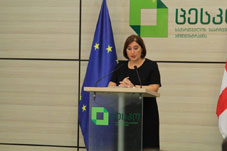
Head of Georgia’s Central Election Commission resigns
By Khatia Bzhalava
Thursday, July 1
The head of Georgia’s Central Election Commission (CEC) Tamar Zhvania resigned on Wednesday, citing that her resignation would “allow political parties to elect a CEC chairperson based on the updated Election Code.” Per the amendments in the code, the new CEC head will be chosen by the parliament of Georgia after the nomination by the president of Georgia and not by the CEC itself.
Zhvania has held the post since 2013. She was elected as the CEC Chairperson on December 24, 2018, for a second term. Although she could serve in the administration for more than two more years, Zhvania believes that the regulations adopted under Charles Michel’s Agreement “have brought a new reality”. “Therefore, the election of a new CEC chairperson according to the new rule will be an additional contributing factor to a broad political consent,” Zhvania noted.
Zhvania also said that her resignation would “increase the opportunity of constructive relations between the political forces that will benefit the election administration, the upcoming election process and the whole country.”
She stressed that during her leadership the CEC organized six general and several midterm elections in the country, received 7 international awards and international recognition.
According to Zhvania, she is not going to become a political figure as her plans are related to working in an international organization.
According to the amendments in the Election Code, President Salome Zurabishvili has two days to name a new candidate for the post. The nominee must be appointed by 2/3 of votes in the Parliament.
Georgian opposition parties have accused Zhvania of fabricating the 2020 parliamentary elections, along with the ruling party, thus her resignation was among the key demands of the opposition. After several months of political deadlock in the country, the opposition, as well as the ruling party, signed a compromise paper proposed by the European Council President Charles Michel. The agreement includes the implementation of major electoral and judiciary reforms.


